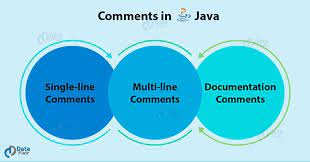Comments in Java are the part of a program that’s not executed. The compiler simply ignores comments because they aren’t intended for it. They’re written in “human” language and are intended to explain the program, part of the program, a single line or method for developers or people involved in the development. Most often, comments are written in English, it’s kind of a tradition. In this article, we are going to talk about comments in Java and how to use them correctly to make life easier for you and your teammates.
The Java comments are the statements in a program that are not executed by the compiler and interpreter.
Types of Java Comments
There are three types of comments in Java.
- Single Line Comment
- Multi-Line Comment
- Documentation Comment

Single-Line Comments
These comments begin with // and extend to the end of the line. They are used for short, single-line explanations.
// This is a single-line comment
int x = 5; // Initializing variable x to 5Multi-Line Comments
These comments start with /* and end with */. They can span multiple lines and are typically used for longer explanations or commenting out blocks of code temporarily.
/* This is a multi-line comment
It can span multiple lines */
int y = 10; /* Initializing variable y to 10 */Documentation Comments
These comments are used to generate documentation automatically. They start with /** and end with */. They are commonly used to document classes, methods, and fields.
/**
* This class represents a person.
*/
public class Person {
private String name;
/**
* Constructs a person with the given name.
* @param name the name of the person
*/
public Person(String name) {
this.name = name;
}
/**
* Gets the name of the person.
* @return the name of the person
*/
public String getName() {
return name;
}
}Comments Are Useful For Several Reasons
1. Code explanation
Comments provide insights into the purpose, functionality, or logic behind a particular piece of code. They make the code more understandable for other developers who may need to read or modify it in the future.
2. Code documentation
Comments serve as documentation that can be read and understood by other developers. They explain how different components of the code work, their expected behaviour, and any special considerations.
3. Code debugging
Comments can be used to temporarily disable or “comment out” sections of code for debugging purposes. This allows you to isolate specific code segments without deleting them entirely.
4. Collaboration
When working on a team, comments facilitate collaboration and communication between team members. They can share insights, instructions, or suggestions within the code, making it easier for others to understand and work with.
Conclusion
The article effectively covers the significance of comment in Java, highlighting their role in enhancing code readability, maintainability, and facilitating teamwork. Comments in Java, whether single-line, multi-line, or documentation, serve as a bridge between complex code and human understanding, ensuring that software development is more accessible, efficient, and collaborative. Incorporating well-thought-out comments into your Java code not only aids in current development efforts but also paves the way for future enhancements and maintenance activities.
Frequently Asked Questions
Ans: Comments enhance code readability and maintainability by explaining the purpose and logic of code segments, aiding both the original authors and others who may work on the code later.
Q2. What is the difference between single-line and multi-line comments in Java?
Ans: Single-line comments (//) are for brief notes and apply to a single line, while multi-line comments (/* ... */) span across multiple lines for longer explanations or temporarily disabling code.
Q3. When should I use documentation comments (Javadoc) in Java?
Ans: Use documentation comments for generating detailed documentation of classes, methods, and fields, especially when creating libraries or components to be used by others.
Q4. Can comments affect the performance of a Java program?
Ans: No, comments do not impact Java program performance; they’re ignored by the compiler and serve only for readability and documentation purposes.
Q5. Is it possible to comment out multiple lines of code in Java?
Ans: Yes, by using multi-line comments (/* ... */), you can temporarily disable or annotate multiple lines of code.
Q6. What are some best practices for writing comments in Java?
Ans: Keep comments clear, concise, and relevant. Use them to explain complex logic, update them as code changes, avoid redundancy, and rely on meaningful names to reduce the need for comments.

